Iranian leaders reacted angrily to President Trump’s Executive Order on January 27 banning citizens of seven Muslim-majority countries — Iran, Syria, Somalia, Sudan, Libya, and Yemen — from entering the United States for 90 days. Foreign Minister Mohammad Javad Zarif said the ban is “a clear insult to the Islamic world, and especially the great nation of Iran” that will be “a great gift to extremists and their supporters.”
In a statement, the foreign ministry vowed to reciprocate the ban. Iranian media reported that a special committee would review the planned visit of the U.S. wrestling team for the Freestyle World Cup in February 2017. The ban made front-page news, with many newspapers railing against the ban. Javan (or “The Youth”) newspaper said the subsequent protests against Trump’s order reflected the worldwide rejection of “American Democracy.”
On the eve of the Academy Awards, the director and lead actress in the Oscar-nominated film “The Salesman” announced they would boycott the ceremony. Asghar Farhadi released a statement that he would not attend even if he were granted an exception. His film, “A Separation” won an Oscar for best foreign-language film in 2012. The film’s lead actress, Taraneh Alidoosti, called the visa ban racist in a tweet. “Whether this will include a cultural event or not, I won't attend the Academy Awards 2017 in protest.”
Trump has stood by his decision. “The seven countries named in the Executive Order are the same countries previously identified by the Obama administration as sources of terror,” the President said in a statement on January 29. The order also suspends entry of refugees for 120 days and bars Syrian refugees indefinitely. The following is a rundown of reactions from Iran.
Officials
Foreign Minister Mohammad Javad Zarif
#MuslimBan will be recorded in history as a great gift to extremists and their supporters.1/7
— Javad Zarif (@JZarif) January 28, 2017
Collective discrimination aids terrorist recruitment by deepening fault-lines exploited by extremist demagogues to swell their ranks. 2/7
— Javad Zarif (@JZarif) January 28, 2017
International community needs dialogue & cooperation to address the roots of violence & extremism in a comprehensive & inclusive manner. 3/7
— Javad Zarif (@JZarif) January 28, 2017
#MuslimBan shows baselessness of U.S. claims of friendship with the Iranian people while only having issues with the Government. 4/7
— Javad Zarif (@JZarif) January 28, 2017
While respecting Americans & differentiating between them &hostile U.S. policies, Iran will take reciprocal measures to protect citizens.5/7
— Javad Zarif (@JZarif) January 28, 2017
Full statement of the Ministry of Foreign Affairs of the Islamic Republic of Iran on the #MuslimBan. 6/7 pic.twitter.com/Y3gAxT0B8m
— Javad Zarif (@JZarif) January 28, 2017
Unlike the U.S., our decision is not retroactive. All with valid Iranian visa will be gladly welcomed. #MuslimBan 7/7
— Javad Zarif (@JZarif) January 28, 2017
Jan. 28, 2017
Statement of the Ministry of Foreign Affairs
In the Name of God, the Compassionate, the Merciful
The decision of the Government of the United States to impose restrictions on the travel of Muslims to the United States – though temporarily for three months – is a clear insult to the Islamic world, and especially the great nation of Iran; and despite claims of being made to combat terrorism and protecting the people of the United States, it will be recorded in history as a great gift to extremists and their supporters.
While the international community needs dialogue and cooperation to address the roots of violence and extremism in a comprehensive and inclusive manner, and at a time when the United Nations General Assembly approved by consensus the proposal of the President of the Islamic Republic of Iran for a World Against Violence and Extremism (WAVE), the imprudent decision of the U.S. Government to apply collective discrimination against citizens of Muslim countries will only serve to provide a fertile ground for more terrorist recruitment by deepening the ruptures and fault-lines which have been exploited by extremist demagogues to swell their ranks with disenfranchised and marginalized youth, and further promote their campaign of hatred, violence and extremism. Moreover, with this decision, the reports of U.S. intelligence and security organs and past statements of current US officials which emphasized on the role of the United States and its regional allies in fomenting and expanding extremist groups, including Daesh (ISIL), appear to have been conveniently forgotten.
The decision of the Government of the United States to target the people of Iran and clearly insult all sections of this great nation has put on clear display the baselessness of the U.S. claims of friendship with the Iranian people while only having issues with the Government of Iran. It also shows the rancor and enmity of some in the US government and influential circles both within the United States and abroad towards all Iranians around the world: The Iranian nation who, benefiting from an ancient and rich civilization and religious beliefs founded on humanitarian values, has always promoted the message of constructive engagement, not only resisted domination but also the temptations to dominate others, and fought extremism and violence; a resilient nation which has stood firm in the face of extremist terrorists and which was among the first victims of organized terrorism; a great people which has had no presence in any extremist terrorist operation, but instead in all societies in which it has traveled or resided as scientists, students, entrepreneurs, tourists or immigrants, has been known as one of the most law abiding, cultured, educated and successful communities, thus representing its Iranian and Islamic culture and civilization in the most dignified and peace-loving manner.
To ensure respect for the dignity of all members of the great Iranian nation at home and abroad, the Government of the Islamic Republic of Iran will engage in a careful assessment of the short and medium-term impact of the decision of the U.S. Government on Iranian nationals, and will take proportionate legal, consular and political action and while respecting the American people and differentiating between them and the hostile policies of the U.S. Government – will take reciprocal measures in order to safeguard the rights of its citizens until the time of the removal of the insulting restrictions of the Government of the United States against Iranian nationals.
In order to monitor the implementation of this decision and adopt appropriate measures commensurate with national interest in specific cases, a mechanism is established in the Ministry of the Foreign Affairs of the Islamic Republic of Iran with the participation of relevant organizations.
Meanwhile, all diplomatic and consular missions of the Islamic Republic of Iran have been instructed to prioritize the provision of consular facilities to all Iranian nationals who due to the illegal step of the Government of the United States have been prevented from returning to their places of residence, work and education.
The decision of the Government of the United States incorporates certain requests that are illegal, illogical and contrary to international law. Considering the absence of relations between the Islamic Republic of Iran and the United States, those requests are not applicable to and cannot be accommodated by the Government of the Islamic Republic of Iran. Any abuse by the United States of this situation to prolong the discriminatory measures and cause any further inconvenience for Iranian nationals is not only illegal but against common sense.
The Islamic Republic of Iran will carefully examine and legally pursue any negligence or violation of the international obligations of the United States under bilateral agreements and multilateral arrangements and reserves the right to respond as deemed necessary.
President Hassan Rouhani
“We’re neither xenophile, nor xenophobe. We’re Muslims, Iranians and revolutionary people.”
Iran “will make use of constructive interaction with the world to benefit its own people.”
—Jan. 30, 2017, at a ceremony at Ayatollah Khomeini’s mausoleum commemorating the 38th anniversary of the Islamic Revolution
"He [Trump] is new to politics. He has been in a different world. It's a totally new environment to him."
“It will take him a long time and will cost the United States a lot, until he learns what is happening in the world.”
“The president of a country assumes that if he bans the [issuance of] visas for the people of a few countries, he can distance humans from each other, but this is wrong. However, this is to be expected from those who are novices in the world of politics.”
“They [the US administration] chanted slogans for years that we are against the Iranian government but support the Iranian people, but since this person [Trump] is a special person, he revealed this hypocrisy and displayed what is in their hearts. He took measures that merely target a number of our dear citizens or Muslims and people in other countries.”
“Today is not a time for separating nations by walls.”
—Feb. 1, 2017, at a ceremony marking National Day of Space Technology via Al-Monitor and Reuters
Foreign Ministry Spokesman Bahram Ghasemi
The ban is “inappropriate and discriminatory” and “proves once again the U.S. officials’ disregard for international laws, rules and norms.”
—February 2, 2017, according to PressTV
First Vice President Es’haq Jahangir
The ban is “illegal, inhumane and in violation of human rights.”
“We will take a reciprocal measure regarding visa issuance for American citizens who want to travel to Iran,”
“We will support our nationals throughout the world with all means at our disposal,”
—Jan. 30, 2017, according to the media
Parliament Speaker Ali Larijani
“Making mention of Iran here under the pretext of concerns about terrorist acts sounds more like a joke,”
The ban show’s the US’s “violent and racist attitude”
“even afraid of their own shadow,”
“A country, which boasts security power, would not take such decisions out of presentiment, anxiety, and phobia.”
“A safe country wouldn’t take hasty decisions,”
“It is crystal clear that Iran has always been standing against terrorists and some countries have also joined Iran.”
“Iran is a safe and independent country, and unlike unwise U.S. policies, is capable of paving the way to develop international interactions.”
“Iran supports peaceful coexistence based on Islamic values and is serious in fighting terrorism.”
—Jan. 29, 2017, in an open session of parliament
Foreign Policy advisor to the Supreme Leader, Ali Akbar Velayati
"It is the pride of Iranians that they don't need acceptance from an imbalanced individual such as Trump. … Without doubt, these kinds of measures will be detrimental to the future of the United States and what can be evaluated about the future of this country is that day by day its domestic problems are getting worse."
—Jan. 29, 2017, in a press conference
Deputy Chief of Staff to the President for political affairs, Hamid Aboutalebi
“Mr. President of the United States, the Iranian nation is the symbol of identity and Aryan history, Islamic humanitarianism, freedom, liberty and philanthropy. You have definitely seen the Cyrus Cylinder? The Iranian nation is an ancient and very civilized nation. It doesn’t tolerate violence and terror and will stand up to it.”
“You have definitely read history, Mr. President. You should remember that the Iranian nation has been strong and proud for more than 3,000 years. Nobody has been able to belittle Iranians during their history.”
—Jan. 27, 2017, in two tweets translated by Al-Monitor
Tehran Chamber of Commerce Chairman Masoud Khansari
“Iranian businessmen, like other persons, aren’t allowed to go to the United States following Trump’s executive order, and this order puts some restrictions on the trade between the two countries.”
—Jan. 28, 2017, in an interview with Tasnim, reported by Rajan, translated by Al-Monitor
Cultural Figures
Actress Taraneh Alidoosti
Trump's visa ban for Iranians is racist. Whether this will include a cultural event or not,I won't attend the #AcademyAwards 2017 in protest pic.twitter.com/CW3EF6mupo
— Taraneh Alidoosti (@t_alidoosti) January 26, 2017
Film director Asghar Farhadi
Jan. 29, 2017 excerpt from statement to The New York Times
I regret to announce via this statement that I have decided to not attend the Academy Awards Ceremony alongside my fellow members of the cinematic community.
Over the course of the past few days and despite the unjust circumstances which have risen for the immigrants and travelers of several countries to the United States, my decision had remained the same: to attend this ceremony and to express my opinions about these circumstances in the press surrounding the event. I neither had the intention to not attend nor did I want to boycott the event as a show of objection, for I know that many in the American film industry and the Academy of Motion Picture Arts and Sciences are opposed to the fanaticism and extremism which are today taking place more than ever. Just as I had stated to my distributor in the United States on the day the nominees were announced, that I would be attending this ceremony along with my cinematographer, I continued to believe that I would be present at this great cultural event.
However, it now seems that the possibility of this presence is being accompanied by ifs and buts which are in no way acceptable to me even if exceptions were to be made for my trip. I would therefore like to convey via this statement what I would have expressed to the press were I to travel to the United States. Hard-liners, despite their nationalities, political arguments and wars, regard and understand the world in very much the same way. In order to understand the world, they have no choice but to regard it via an “us and them” mentality, which they use to create a fearful image of “them” and inflict fear in the people of their own countries.
This is not just limited to the United States; in my country hardliners are the same. For years on both sides of the ocean, groups of hardliners have tried to present to their people unrealistic and fearful images of various nations and cultures in order to turn their differences into disagreements, their disagreements into enmities and their enmities into fears. Instilling fear in the people is an important tool used to justify extremist and fanatic behavior by narrow-minded individuals. ...
Newspapers
Ka’enat
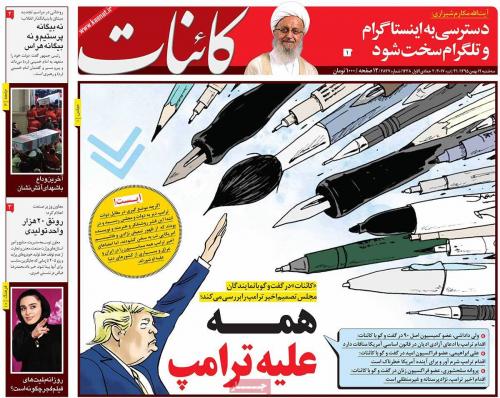
In photo: “All Against Trump”
Javan
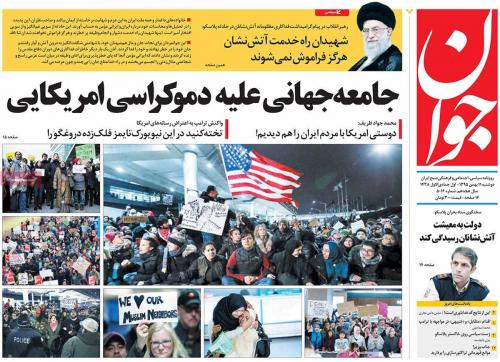
Main headline: “World Community against American Democracy”
Top right: “Zarif: We Saw How US Is Friend of Iranian People!”
Top left: “Trump’s Reaction to US Media Protests: Let This FAKE News and Failing New York Times Fold!”
Sepid
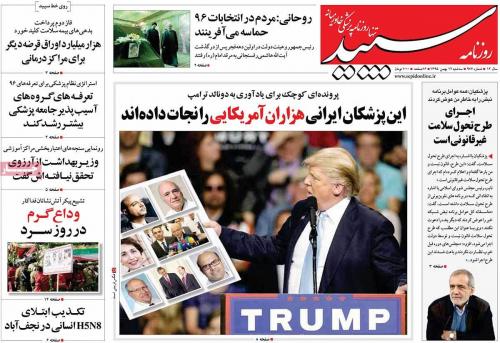
Main headline: “A small case for Trump to remember: These Iranian doctors have saved thousands of Americans”*
*This photo appears to be altered
Amin
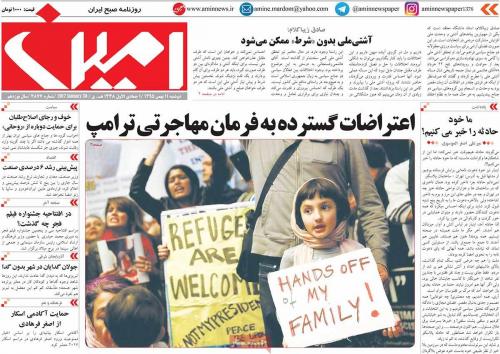
Rooyesh-e Mellat
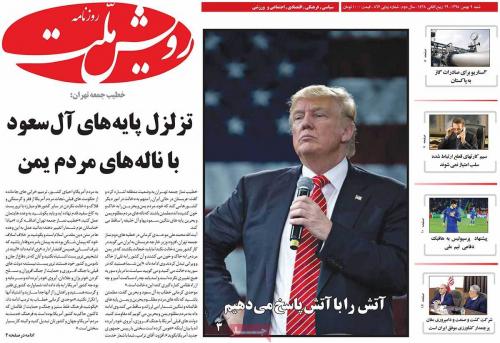
Bahar
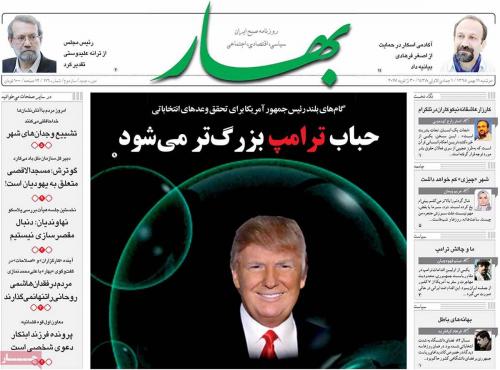
Iran
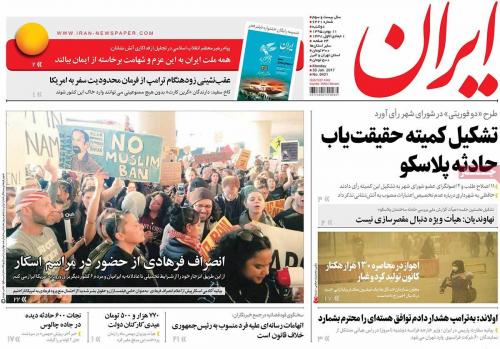
Abrar
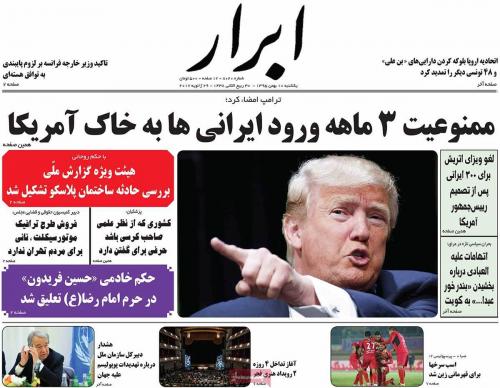
Etemad
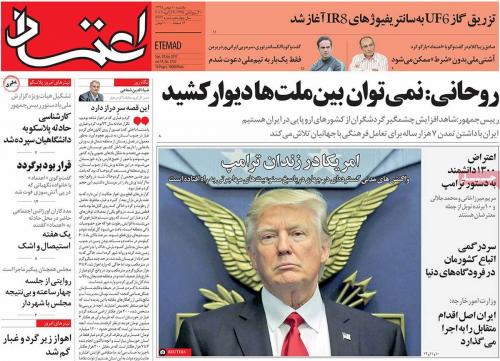
Iran
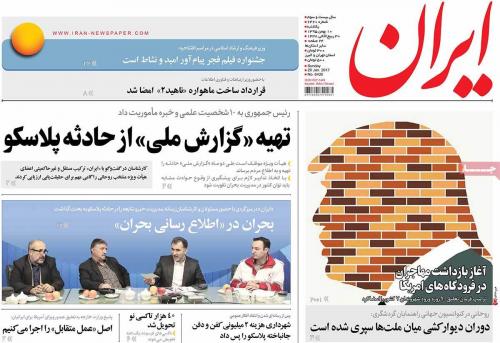
Javan
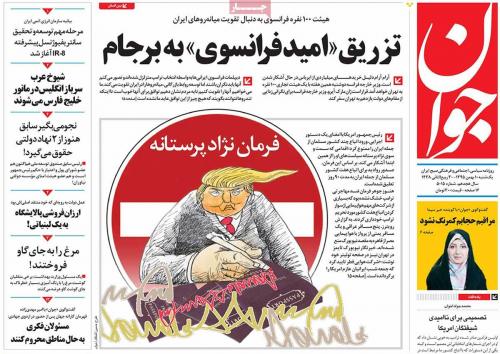
Shahrvand
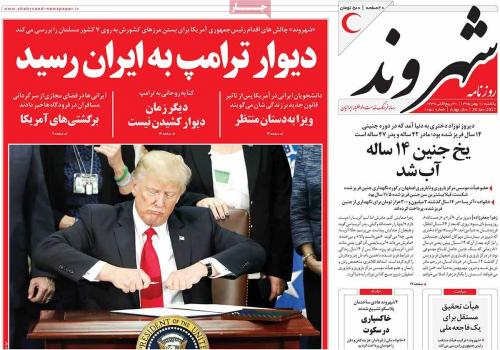
Vaghaye Ettefaghieh
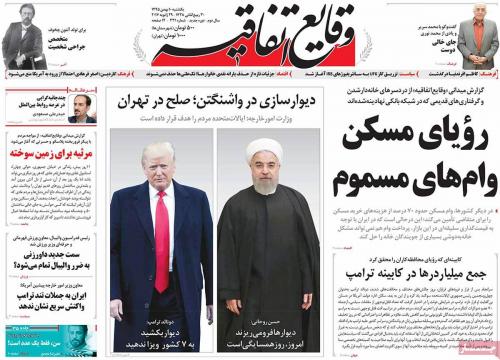
Photos and some translations by Iran Front Page on Jan. 28, Jan. 29, Jan. 30, and Jan. 31
Daniel Schnur, a research assistant at the U.S. Institute of Peace, contributed to this roundup.
Cover photo of Donald Trump by Gage Skidmore via Flickr Attribution-ShareAlike 2.0 Generic (CC BY-SA 2.0)
